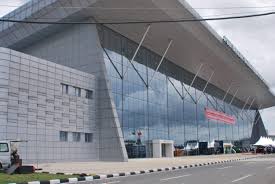
The federal government has insisted that it must concession Nigeria’s major airport terminals to secure investors that would expand the facilities in order to meet increasing passenger traffic, projected to reach 55 million by 2024.
This is in line with the projection of the International Air Transport Association (IATA), which stated that air transport growth would increase in the Middle East and Africa in the next 20 years but expressed fear that the regions may not have the needed airport infrastructure to accommodate the increase.
The Minister of Aviation, Senator Hadi Sirika has argued that government would not have the huge resources needed to modernise and expand the airport facilities; therefore, private investment funds are needed, hence the concession.
The Minister in a presentation to industry stakeholders on Tuesday during a Webinar conference stated that the airports in Nigeria are currently operating in a suboptimal environment, most notably due to the following factors that would have to be improved as part of the PPP programme.
These include urgent need of infrastructure investments and modernisation. All Airports require investments in runway maintenance, navigation aids as well as terminal facilities; relatively low asset utilisation due to the limited opening hours of other smaller Nigerian airports; lack of terminal capacity, as the airports fall short of gates, stands and check-in desks and that the airports have not been designed as international hubs but operate separate international and domestic terminals.
Sirika also explained that in response to the population growth and its increasing affluence, a private operator of the four main airports in the country would be able to operate the airports under a globally accepted standards and expand the facilities in accordance with traffic demand at each airport.
“Typically, on airport PPP projects, the authority sets minimum service levels for the concessionaire to comply with. This will provide the authority with a tool to set service standards for the operation of the terminals and secure a reliable high-level product.
“A strong aviation industry provides the country with a high connectivity, both on a domestic and international scale. This has several economic and social benefits for the country as identified in this Outline Business Case (OBC). These include time and cost savings for companies, efficiency gains for the economy, increased connectivity for remote regions, and improved access to health care,” the Minister said.
Appraising the economic implication of the planned concession, the Ministry of Aviation in earlier report disclosed that the forecast of total traffic for the four airports in Nigeria is expected to grow on average at 5.3 per cent over the next 30 years, from 11 million passengers in 2017 to 55 million by 2048. This would be largely driven by the strong population growth and affluence of the population, adding that the concessionaire is required to provide sufficient capacity to handle this amount of forecast traffic.
The Ministry said that in addition to the terminals that are currently under construction, the concessionaire is required to refurbish the existing facilities in Abuja and Port Harcourt. In Lagos a new terminal needs to be constructed and the existing international terminal decommissioned.
But criticisms have trailed the concession plan of the federal government. Aviation analyst and Principal Managing Partner, Avaero Capital, Sindy Forster said the concession plan “certainly does not sound like it requires a 30-year concession,” as implied in the presentation.
“What investment they (the concessionaires) will be bringing isn’t even clear. But beyond that the impact on the rest of the sector seems to be missing. Not enough analysis appears to have been done. What I find here is that people do what people in authority want without questioning or adding value. That does a disservice to everyone involved. Professionals need to speak up and be consultants when they see things, which don’t add up. Life is not about agreeing with everything for money. Even with best intentions mistakes can happen. The industrial history of Nigeria is a litany of mistake after mistake. Let this not be another one,” she said.
Also former Minister of Aviation, Osita Chidoka has expressed disagreement with the concession approach taken by both the Infrastructure Concession Regulatory Commission (ICRC) and Bureau of Public Enterprise (BPE), saying that they want to take the best part of the Federal Airports Authority of Nigeria (FAAN) and give it to private investors who may not have the wherewithal to effectively manage the facilities.
Chidoka who made this known during the virtual stakeholder’s meeting to update on the concession of the four international airports, likened the process to what transpired in the power sector where the discos after concession did not have the funding to even meter the customers and is constantly blaming government.
THISDAY






